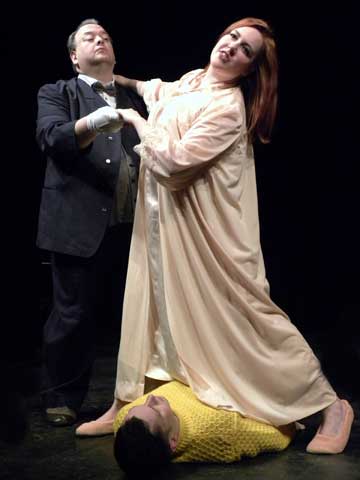Next story: It Follows
Alleyway and BUA Feature Big Things in Small Packages
by Anthony Chase

Short Works
It’s short play season down at the Alleyway Theatre complex on Main Street. Alleyway and BUA are both offering short works festivals, Alleyway is hosting their annual “Buffalo Quickies” on the Main Stage; and resident guest company, Buffalo United Artists is offering their annual festival of short GLBT works, “BUA Takes Ten” in the cabaret space.

Alleyway Theatre has been doing the Buffalo Quickies, a festival of short plays, for a very long time. 24 years, to be exact.
“I know!” exclaims Joyce Stilson, director of the festival. “24 years! How did that happen?”
Stilson notes that the popular festival, which attracts hundreds of submissions, has evolved over the years. The ability for playwrights to send their work electronically has simplified the process.
“The plays come from all over,” says Stilson. “I do like to look at the postage stamps.”
Sometimes the Quickies have a theme; sometimes not.
“That’s never really planned,” explains Stilson. “Sometimes it just happens. This year we have two plays by local writers that feature mystics or psychics, so we wondered if that could be a theme, but it didn’t really happen. We just went with the best work that came in.”
Local playwright Donna Hoke has the distinction of having her work featured in both festivals. She is also co-curator, with Matthew Crehan Higgins, of “BUA Takes 10.”
“Short plays are a great way to experiment with little time investment,” says Hoke. “I can try out characters who aren’t people, or be absurd, or just pursue an idea that may only be a ten-minute idea. I’m much more comfortable playing with comedic choices in ten-minute plays, and my first full-length comedy actually grew out of a ten-minute. They’re also satisfying if you’re in the research phase of a full-length play and not really writing but having an itch to; those in-between times are usually when most of my ten-minute plays happen. Finally, they’re a great way to network with theaters because for every ten-minute play you have produced—and I’m at about 130 around the world now—you meet a theater. I’ve had full-length productions come from relationships that started with ten-minute plays.
Stilson confirms these observations. Some of Alleyway’s strongest relationships with playwrights began with the Quickies.
In addition to the theme of brevity, BUA Takes 10 has the built in theme of Gay, Lesbian, Bi, and Trans experience. This presents challenges.
“We probably get twice as many G as L submissions” she reveals. “And the comedies also tend to be more the G than the L, so while we want good balance between G and L, we also want to make sure that there are both dramas and comedies for each; that means it’s not as simple as just choosing the ten we like best. Sadly, we don’t really get T or B plays. Beyond selection, I think Matt would say that because there are so many directors and actors, putting together and keeping to a rehearsal schedule with so many moving parts is the challenge.”
With brevity, comes simplicity. Stilson and Hoke see this in the quick slices of life submitted to their festivals.
“BUA Takes 10 is nearly all two-handers [this year],” says Hoke, “which wasn’t intentional...I think it’s because so many calls for ten-minute plays ask that they be simple, easy to stage, with minimal set and props—and a two-hander is usually the epitome of those parameters. Playwrights are just writing to the demand for easy-to-stage plays in the hopes of bettering their odds.”
Bettering their odds is a big motivator for playwrights to write short works and to submit them to festivals.
“[Short plays] are good resume builders,” says Hoke. “With ten-minute plays, playwrights aren’t competing with the big names for a few precious spots in a theater’s season, so the likelihood of being produced is much greater. For theaters, it’s a chance to meet and present new playwrights with very little risk to their bottom line. And for patrons, it’s a smorgasboard that’s bound to serve something pleasing.
For those in the mood to be so pleased, both festivals continue through April 11th. See On the Boards for details.
|
Issue Navigation> Issue Index > v14n13 (Week of Thursday, April 2) > Alleyway and BUA Feature Big Things in Small Packages This Week's Issue • Artvoice Daily • Artvoice TV • Events Calendar • Classifieds |









 Current Issue
Current Issue